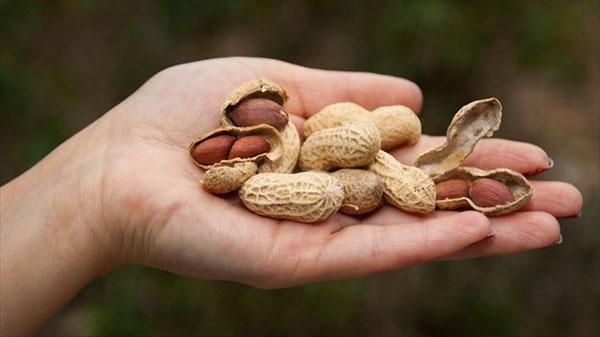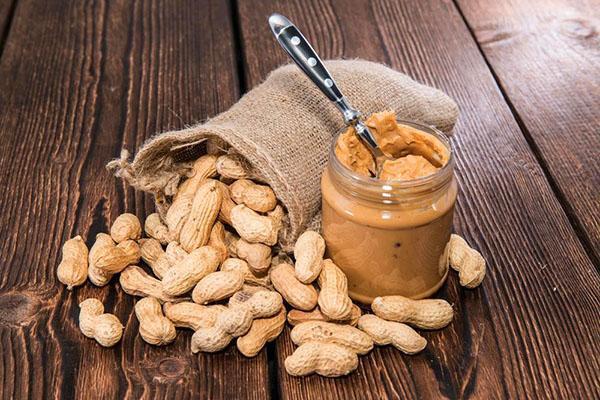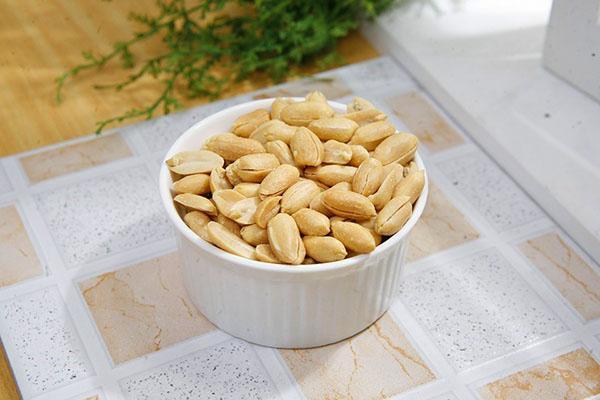Consumption rates, calorie content, benefits and harms of peanuts
 Discovered by Europeans in the 16th century, peanuts in the same century were widespread in the Asian colonies, then came to Africa, the Old World and Russia. Today, peanuts, the benefits and harms of which are well studied, is the most valuable agricultural crop for many regions of the world.
Discovered by Europeans in the 16th century, peanuts in the same century were widespread in the Asian colonies, then came to Africa, the Old World and Russia. Today, peanuts, the benefits and harms of which are well studied, is the most valuable agricultural crop for many regions of the world.
Due to their physical resemblance, peanut seeds are often considered and even traditionally referred to as "peanuts." However, this opinion is wrong. Peanuts are the closest relative of regular peas, beans and soybeans.
This legume plant with unusual dense pods that ripen underground is prized by farmers for its high yield, unpretentiousness and quick return. High in protein and fat, beans are used in the food and biochemical industries. Ordinary consumers know peanuts as a raw material for butter and peanut butter, love it for its pleasant taste, appropriate in a variety of snacks and pastries.
But what are the beneficial properties of peanuts, are there any contraindications? Should you get carried away with this product or is it better to limit its use?
Energy value and calorie content of peanuts

- 26.3 grams of protein;
- 45.2 grams of fat;
- 9.9 grams of carbohydrates.
It is not surprising that with such a high energy value, the calorie content of peanuts is very high. 100 grams of fresh, ripe beans provide the body with 552 kcal. After drying, the number of calories increases by another 50-60 units.
Biochemical composition and nutritional value of peanuts
 The usefulness or harmfulness of the product directly depends on the set of vitamins, trace elements, amino acids and other biologically active components. Therefore, before giving an answer to the question: "What is the use of peanuts for the body?", It is worthwhile to dwell in more detail on the biochemical composition of the beans used for food.
The usefulness or harmfulness of the product directly depends on the set of vitamins, trace elements, amino acids and other biologically active components. Therefore, before giving an answer to the question: "What is the use of peanuts for the body?", It is worthwhile to dwell in more detail on the biochemical composition of the beans used for food.
Per 100 grams of peanuts:
- up to 21 grams of starch;
- 4.2 to 7.2 grams of sugars;
- 8.3 grams of saturated fatty acids;
- slightly less than 3 grams of ash;
- 8.1 grams of dietary fiber;
- almost 8 grams of water.
A significant contribution to the nutritional value of peanuts is made by numerous vitamins, including ascorbic acid and choline, an almost complete group of B vitamins, as well as vitamins E and PP. The product is rich in globulins, purines and fatty acids. There is biotin in the seeds that is useful for skin and hair. An equally impressive list of minerals. The bouquet of micro- and macroelements in peanuts includes magnesium and iron, zinc and copper, potassium and calcium, sodium, manganese and phosphorus.
What are the benefits of peanuts for the body?
 Today, peanuts are an affordable tasty product that differs little from real nuts in terms of health and nutritional value. Dried, fried, salted, with sugar and caramel, seeds are used as a high-calorie snack or snack. They perfectly enrich the taste of confectionery and baked goods.
Today, peanuts are an affordable tasty product that differs little from real nuts in terms of health and nutritional value. Dried, fried, salted, with sugar and caramel, seeds are used as a high-calorie snack or snack. They perfectly enrich the taste of confectionery and baked goods.
To eat peanuts with benefit and without harm to the body, you need to remember about moderation and the presence of medical contraindications!
Since the seeds of this crop are rich in magnesium, amino acids, most of which are essential, proteins and vitamins, the inclusion of peanuts in the daily diet will be of great help to the heart and vascular system. Bioactive substances not only take care of the health of the heart muscle, but also, due to the absence of cholesterol, help to maintain the purity of blood vessels. A small amount of peanuts eaten per day turns from a delicacy into the prevention of atherosclerosis, hypertension and other ailments associated with blood pressure and heart function.
 Trace elements and vitamins in peanut kernels guarantee an excellent supply of energy and everything necessary to maintain health and youth. The calorie-rich product transfers them generously to the body, allowing a person to:
Trace elements and vitamins in peanut kernels guarantee an excellent supply of energy and everything necessary to maintain health and youth. The calorie-rich product transfers them generously to the body, allowing a person to:
- recover quickly from hard work;
- gain strength after illness, injury or surgery;
- tirelessly endure serious physical and mental stress for a long time;
- fuel your strength when there is no opportunity to eat well.
At the same time, peanuts with benefit and without harm to a person maintains his stable mental and psychological state. The substances contained in the seeds not only actively resist stress, but also help fight signs of depression, anxiety, sleep disorders, and chronic fatigue. This beneficial property of peanuts has no contraindications and can be used by men and women in a variety of situations.
Eating peanuts, according to doctors and nutritionists, helps to strengthen the immune system in order to successfully resist seasonal colds and everyday stress.
 The group of B vitamins, which occupies an important place in the composition of peanuts, is irreplaceable:
The group of B vitamins, which occupies an important place in the composition of peanuts, is irreplaceable:
- for fruitful brain function;
- for the ability to quickly memorize and a good, long memory;
- to maintain concentration on the assigned tasks.
These qualities are important for people of all ages, from young children to retirees. If we talk about middle and older age, then the benefits of peanuts are invaluable, as they can resist the aging process and cancer without harm to health. The point is in natural antioxidants, at the cellular level, reducing or completely stopping the negative influence of the environment, leading to aging or the appearance of tumors.
Health benefits of peanuts for men and women
Do not underestimate the high content in peanuts proteins and fats. The former are the building blocks for fabrics. The second is affordable, quickly assimilated energy. This allows men to use peanuts without harm and with benefit wishing to gain muscle mass. Tasty beans, in addition, contain zinc useful for the stronger sex, as well as a lot of vitamins that are indispensable for an active lifestyle.
 Today, doctors are confident that a small amount of peanuts on the menu works as a safe natural hormonal agent that allows you to stabilize the work of this body system, for example, during adolescence, during pregnancy and after relief from the burden, as well as when menopause occurs. This is an invaluable benefit for women, but the harm of seeds is possible here if you do not follow the doctor's recommendations and neglect reasonable moderation.
Today, doctors are confident that a small amount of peanuts on the menu works as a safe natural hormonal agent that allows you to stabilize the work of this body system, for example, during adolescence, during pregnancy and after relief from the burden, as well as when menopause occurs. This is an invaluable benefit for women, but the harm of seeds is possible here if you do not follow the doctor's recommendations and neglect reasonable moderation.
Eating peanuts is not prohibited while carrying a child, is it possible for peanuts to be breastfed? Yes, if the expectant mother has no signs of allergy to this type of legumes, and also the attending physician did not recommend adhering to a special diet. Not only will such a snack help to cope with mood swings, it will fill the deficiency of iron, magnesium, calcium and other minerals that are necessary for the production of high-grade milk, and for the health of the woman herself.
The harm of peanuts to the body
 With all the beneficial properties of peanuts, there are still contraindications to its use.First of all, a fiber-rich product can not only cleanse the intestines, but also lead to an exacerbation of chronic diseases in this area. Eating seeds should be abandoned for peptic ulcer and gastritis, pancreatitis and other diseases.
With all the beneficial properties of peanuts, there are still contraindications to its use.First of all, a fiber-rich product can not only cleanse the intestines, but also lead to an exacerbation of chronic diseases in this area. Eating seeds should be abandoned for peptic ulcer and gastritis, pancreatitis and other diseases.
According to doctors, there are more and more people in the world with signs of allergies when eating peanuts. Officially, the product is not recognized as an allergen, but the pink or burgundy outer shells of the seeds can make you feel worse, so it is better to remove them before eating.
Men and women suffering from varicose veins, arthritis, arthrosis, and other diseases of the musculoskeletal system feel not the benefit, but the harm from peanuts.
Even healthy people who care about their well-being, it is better to adhere to the measure. If you eat peanuts thoughtlessly and a lot, problems with excess weight and metabolic disorders are guaranteed.
How many peanuts can you eat per day? There is no strictly designated number. It all depends on the state of health and lifestyle of the person, but more often they talk about the daily norm, equal to 30-50 grams of dried seeds without adding salt, additional oil or sugar. In this case, the peanuts must be of high quality, without signs of rancidity or mold.